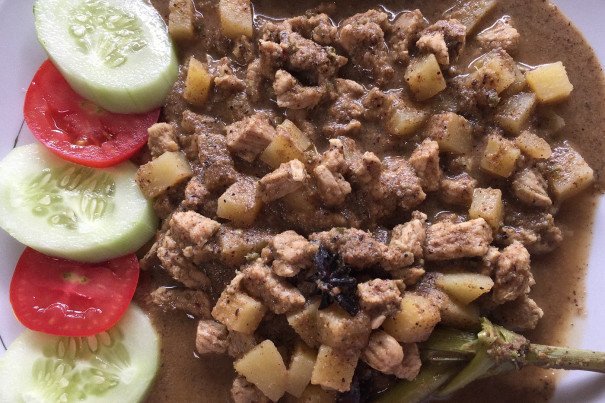
Hopscotching Through the Lands of Pork and No Pork

Hopscotching Through the Lands of Pork and No Pork
Pork saksang in Sumatra
It wasn’t morning, but it was, in the most straightforward sense of the word, breakfast.
I was in Langsa, a city a few hours’ drive north of Medan in Aceh. I had come to visit the Rohingya refugees, Myanmar’s largest Muslim minority fleeing religious and ethnic discrimination in Rakhine State, at shelters that had sprouted up along the coast in the wake of last year’s Southeast Asian boat crisis. Their intended destination had been Malaysia, but due to the vagaries of border controls and the weather, they had ended up here. Nevertheless, it was a welcome respite for them. Aceh is the only province allowed to enforce sharia law by the Indonesian government in a historical concession of partial autonomy to separatists, and here, the Rohingyas could practice their religious customs freely—unlike in Rakhine State, where mosques have been closed or burned down.
By the same token, I had run into logistical hiccups immediately upon arriving in Langsa. I was traveling with a male photographer friend, and we were not allowed to share a room because we weren’t married to each other; in one guesthouse, I wasn’t even permitted a room to myself and had to leave because I was unmarried. “There was an incident here, sometime ago, and you don’t have a husband to protect you,” was all the young male receptionist would go by way of explanation, and apologized profusely for being the cause of any inconvenience. I had also come in the middle of Ramadan, which meant that I couldn’t eat or drink in public during fasting hours, since most of the restaurants were Muslim establishments. I am ethnically Chinese and irreligious, but in Muslim-majority Langsa, flying in the face of local customs would have drawn too much unwanted attention, and, possibly, repercussions.
I ended up finishing my assignment earlier than I’d expected, and with a few days to spare, decided to head south to Lake Toba, the largest volcanic lake in the world. The journey took a whole day, and I started getting hungry on the shared taxi over from a connection in Medan. Mindful of my Muslim companions, however, I refrained from bringing out the biscuits I had packed with me.
Sometime in the evening, but before sunset, the driver pulled the car over and my travel companions started to climb out. When I remained in my seat, the driver asked, “Are you Muslim?”
“No,” I said, as it started to dawn on me that he hadn’t taken my appearance for granted. Back home in Malaysia, a Malay, or someone who looks Malay, like myself, is usually presumed to be Muslim. In Indonesia, you could be Muslim, Hindu or Christian, and it would be hard to tell.
“Come on then,” the driver said, ushering me out, while a young Muslim man stayed in the car to wait.
We walked to a roadside grill covered in sizzling pork, and only pork, done many different ways. My companions ordered the panggang: grilled pork with crispy skin and oozing fat, thrown in with tomatoes and cucumbers and doused with a squeeze of lime and chilli, served with pork broth on the side. I went for the saksang, a curry of diced pork (sometimes substituted with dog meat) that left a tartness on my tongue from the spices. I cleaned up my plate with little effort, since it was both breakfast and dinner for me.
We had moved into the territory of the Batak people, who are generally Christian. Pork was back on the menu, and breakfast would be served in the morning.